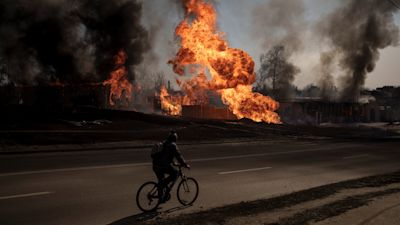Ukraine neutrality status on the table as Russia accused of seeking to create 'a new Korea'

ITV News Global Security Editor Rohit Kachroo reports on the latest peace talks between Russia and Ukraine and the suspected poisoning of Roman Abramovich
Ukrainian President Volodymyr Zelenskyy has said he would consider Ukraine declaring neutrality and showed a willingness to compromise over the Donbas region in order to secure peace “without delay,” as fears were raised Russia was trying to create a divided Ukraine.
While hinting at possible concessions, Mr Zelenskyy stressed that Ukraine's priority is ensuring its sovereignty and its “territorial integrity” - preventing Russia from carving up the country, something Ukraine and the West say could now be Moscow's goal.
Ukrainian Foreign Minister Dmytro Kuleba on Monday said his country's goal at talks with Russia in Turkey is to to agree a ceasefire."The minimum programme will be humanitarian questions, and the maximum programme is reaching an agreement on a ceasefire," he said on national television.
Russia’s invasion of Ukraine has stalled in many areas in the face of staunch Ukrainian resistance, bolstered by weapons from the US and other Western allies.
ITV News Global Security Editor Rohit Kachroo breaks down what we know about Roman Abramovich's reported poisoning
Moscow now claims its focus is on securing the eastern Donbas region, which has been partially controlled by Russia-backed separatists since 2014.
Last week, a high-ranking Russian military official said that troops were being redirected to the east from other parts of Ukraine.
In response, Kyrylo Budanov, the head of Ukrainian military intelligence said the change of focus could reflect Putin’s hope to break Ukraine in two, like North and South Korea, and enforce “a line of separation between the occupied and unoccupied regions.”
“He can’t swallow the entire country,” Mr Budanov said, adding that Russia appears to be trying “to pull the occupied territories into a single quasi-state structure and pit it against independent Ukraine.”
The UK Ministry of Defence said on Monday that the Russian "private military company" known ad the Wagner Group has been deployed to Ukraine.
Up to 1,000 mercenaries are now expected to be deployed to the region, including the group's leadership.
The MoD said due to the heavy losses in Ukraine they believed Russia had been forced to redeploy the Wagner group from operations in Syria and Africa.
Boris Johnson spoke to President Zelenskyy on Monday and reiterated his backing of Ukraine, promising "humanitarian support and more defensive equipment".
Meanwhile, the mayor of Irpin, Alexander Markushin, said the city near Kyiv has been fully recaptured by Ukrainian forces in a video on his Telegram channel.
A US defence official stated on Monday that Ukrainian forces had retaken the town of Trostyanets from Russian control.
It was also reported that the death toll in the eastern city of Mariupol had reached 5,000.
What would neutrality mean for Ukraine?
Earlier, in an interview with independent Russian journalists on Sunday, Mr Zelenskyy said his government would consider offering security guarantees to Russia, including keeping Ukraine nuclear-free, in a bid to end the war, telling the reporters the issue of neutrality – and agreeing to stay out of NATO – should be put to Ukrainian voters in a referendum after Russian troops withdraw.
Russia has long demanded that Ukraine drop any hope of joining the western NATO alliance, which Moscow sees as a threat. The interview was banned in Russia, with media outlets warned they faced action if they took part.
Russia has supported the separatist rebels in Luhansk and neighbouring Donetsk since the insurgency erupted there shortly after Moscow annexed the Crimean Peninsula from Ukraine. In talks with Ukraine, Moscow has demanded Kyiv acknowledge the independence of Donetsk and Luhansk.
A new round of peace talks was slated for this week aimed at ending the war, with Ukraine saying the two sides would meet in Turkey on Monday. Earlier negotiations have failed to make progress on ending the more than month-old war that has killed thousands and driven almost four million Ukrainians from their country.
The Ukraine president said only a face-to-face meeting with Russia's leader could end the war. Russian Foreign Minister Sergey Lavrov said on Monday that Mr Zelenskyy could meet with Russian president Vladimir Putin, but only after the key elements of a potential deal are negotiated. “The meeting is necessary once we have clarity regarding solutions on all key issues,” Mr Lavrov said in an interview with Serbian media. He accused Ukraine of only wanting to “imitate talks,” but said Russia needed concrete results.
Ukraine’s priorities at the talks will be “sovereignty and territorial integrity,” Mr Zelenskyy told his nation in his nightly address.
“We are looking for peace, really, without delay,” he said. “There is an opportunity and a need for a face-to-face meeting in Turkey.”
Mr Zelenskyy made a plea for fighter jets and tanks to help defend his country from Russia’s invading troops after a proposal to transfer Polish planes to Ukraine via the United States was scrapped amid NATO concerns about being drawn into direct fighting.
In his pointed remarks, the Ukrainian president accused Western governments of being “afraid to prevent this tragedy. Afraid to simply make a decision.”
Russia confirmed it used air-launched cruise missiles to hit a fuel depot and a defence plant in Lviv, near the Polish border over the weekend.
Russia’s back-to-back airstrikes shook the city that has become a haven for an estimated 200,000 people who have fled bombarded towns and cities. Lviv, which has largely been spared bombardment, also has been a waystation for most of the 3.8 million refugees who have left Ukraine since Russia invaded on February 24.
For expert analysis of this topic, listen to the Ukraine episodes of the What You Need To Know podcast